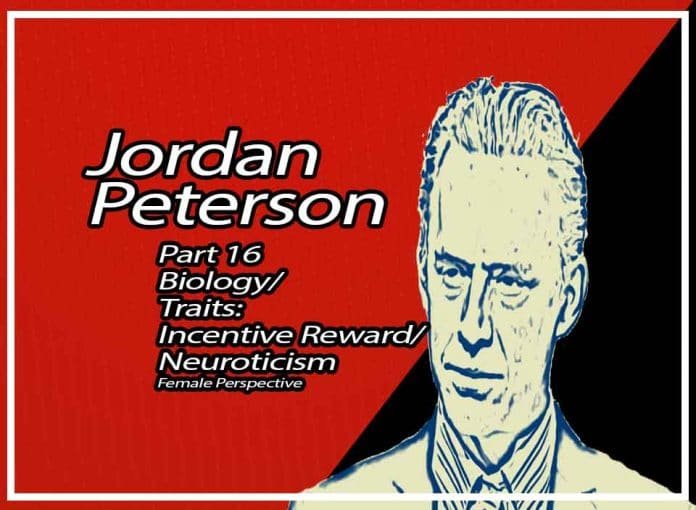Review Female Perspective Part 16 Biology/Traits: Incentive Reward/Neuroticism
Thanks for joining me on my Peterson journey that all started after a dinner table argument about Peterson being some kind of evil force, and I who at the time didn’t know about the guy but also love facts decided to dig a little deeper.
I am reviewing his complete series so if you missed the previous breakdowns and understanding of his 15th lecture please check this out:
Brainstorm This: Biology/Traits: The Limbic System Part 15
I have heard the word your being neurotic bounded about before, but I am interested to see the actual meaning behind this, I hope Peterson delivers:
Biology/ Traits: Incentive Reward / Neuroticism – A Personality Guide By Jordan B. Peterson
In this lecture, Jordan continues to explain the fact that motivation and setting goals develop the personality of a person. For the remainder of this lecture, Jordan will continue his examination of the connection between subcortical brain functions and the major personality traits identified by psychometric researchers, with particular emphasis on the relationship between positive and negative emotion and extraversion and neuroticism.
Key Points
There is always an overlap between the motivations and emotions which help to proceed towards someone’s goals.
- The end-point for any kind of goal is the structure of the motivation system.
- Motivation system is the hypothalamic system.
- The preferences you make to work on a goal disinhibit and activate your behavioural schemes reflected by your personality.
- There is a difference between voluntary behaviour and motivational inhibit behaviour. Motivational behaviour leads toward autonomic responses.
Enjoy: Top 10 Lectures by Jordan Peterson
Summary
The motivational state is therefore a psychophysiological phenomenon that encompasses the entire brain and body.
It is not something as basic as chain behaviour, which was an early kind of behavioural theory, or as easy as only stating a goal, which are both examples of simplistic thinking.
It’s a lot more difficult than that, unfortunately.
According to psychodynamic theory, it is beneficial to consider a motivated state as a micro-personality, which we have previously discussed. Fundamentally, it is focused on achieving a single goal. As a result, while it is not extremely smart, it possesses all of the other characteristics of a personality. So, motivation sets the framework within which goals are sought, as well as the goal itself, and then, generally speaking, emotions, or at least many of the emotions, measure progress towards achievement as a result of the motivational framework. They basically inform you whether or not you’re on the correct course, so that’s a decent method of separating them from one another.
Keep Learning: Top 10 Podcasts by Jordan Peterson
Despite the fact that there is no one motivation system that is superior to a single emotion system, there are several fundamental motives. These are the kinds of things that Sigmund Freud would have linked with Ed on a fundamental level. As a result, he considered those to be primal. That is absolutely accurate because we share nearly all of these motivational systems with other people, as well as with other mammals, and then, of course, with creatures that are farther down the evolutionary chain than humans in terms of evolutionary distance. In other words, some of these systems are really outdated. In reality, all of them are really elderly and hungry, as a result of food scarcity, and they are all plainly thirsty.
The trials have been carried out with sufficient care to account for the influence of opiates on the vocalization process. As a result, this has also led to some speculation that people who have a history of extraordinarily painful personal relationships may be those who are more susceptible to using topi it. Opiates are often known as algae six are substances that essentially dull the sensations of pain, frustration, disappointment, sorrow, and loneliness. As a result, there is an anger and aggressiveness system in place.
Must Read: Short Review of 12 Rules for Life by Jordan Peterson
To learn more about the effect of personality over emotions see https://youtu.be/ewU7Vb9ToXg?list=PL22J3VaeABQApSdW8X71Ihe34eKN6XhCi An extensive guide by Jordan B. Peterson.
Opinion Lecture Sixteen Jordan Peterson
Very enjoyable and do I know more now than when I started watching? That’s a resounding yes. I give this an offence material score of 0 out of 10 and give it a 9 of 10 for educational value. looking forward to the next instalment.
I hope you enjoyed my take and my rough notes from my Jordan Peterson experience. You can find links to the complete series here:
Entire Series: 2017 Personality and Its Transformations Parts 1-22











